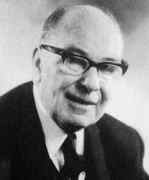Person: Todd, John Arthur

John Todd graduated from Cambridge and stayed on to do research under Baker. After a period at Manchester and Princeton he returned to Cambridge where he spent the rest of his career. He worked on invariant theory, group theory and canonical systems.
Mathematical Profile (Excerpt):
- John Todd was educated at Liverpool Collegiate School and, having sat the scholarship examination for Cambridge, he was awarded an entrance scholarship to Trinity College.
- After graduation Todd remained at Trinity to study for his doctorate in geometry under H F Baker's supervision.
- After an impressive prize winning record Todd hoped for a Research Fellowship at Trinity but he failed in three attempts, on one occasion losing out to Coxeter who won the Fellowship.
- Disappointed at his failure to win the Fellowship, Todd left Cambridge and accepted Mordell's offer of an assistant lectureship at the University of Manchester in 1931.
- An important year for Todd's mathematical development was the session 1933-34 which he spent at Princeton on a Rockefeller Scholarship.
- Lefschetz proved the major influence on Todd during this year in the United States, and this broadened Todd's geometrical interests beyond the classical approach he had learnt under Baker.
- In until 1937 Todd was appointed a lecturer at Cambridge.
- Todd and Hodge began to change the geometry at Cambridge to areas that were then of great interest internationally.
- Sadly, by the time peace had returned and progress could recommence, Todd was no longer a young reformer.
- In 1948 Todd had been elected a Fellow of the Royal Society of London and, given his long association with Trinity College, it seemed inconceivable that he would not be elected a Fellow of the College.
- Despite strong backing by mathematicians in the College, Todd failed to on a number of occasions to be elected.
- By 1958 disillusioned with his treatment by Trinity, Todd went to Downing College.
- Every well-equipped College should have a John Todd and we were privileged to have had him and to have enjoyed his company.
- Todd was a superb technician and manipulator of formulae but he also brought to bear a keen appreciation of the underlying geometry.
- Todd generalised the arithmetic genus and the invariants of the canonical system on an algebraic variety to a system of invariants of every codimension.
- This work is the origin of the Todd genus and Todd polynomials which were named after him.
- Todd polynomials, and certain other closely related polynomials, are much studied today and have played a major role in the study and classification of manifolds.
- In group theory Todd provided, certainly according to Coxeter, the main contribution to their joint work on the Todd-Coxeter procedure which they published in 1936.
- The Todd-Coxeter procedure became the most fundamental idea in the development of computational group theory yet the authors found difficulty in getting their paper published.
- It was at a British Mathematical Colloquium (Todd attended the Colloquium for each one of its first 25 years) where Todd talked on Mathieu groups, a subject to which he made considerable contributions.
- Some young research students in the audience heckled Todd, presumably they considered his mathematics old fashioned.
Born 23 August 1908, Liverpool, England. Died 22 December 1994, Croydon, England.
View full biography at MacTutor
Tags relevant for this person:
Algebra, Group Theory, Origin England
Thank you to the contributors under CC BY-SA 4.0! 

- Github:
-

- non-Github:
- @J-J-O'Connor
- @E-F-Robertson
References
Adapted from other CC BY-SA 4.0 Sources:
- O’Connor, John J; Robertson, Edmund F: MacTutor History of Mathematics Archive
